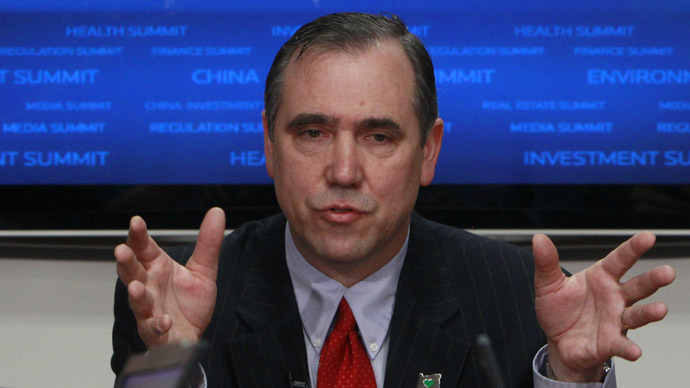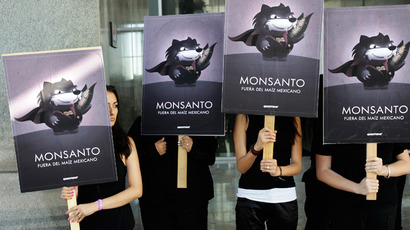‘Monsanto Protection Act’ might be repealed in Senate

The so-called Monsanto Protection Act signed into law earlier this year caused such an outrage that people around the world are planning to protest the biotech company later this month. Now a United States senator is expected to try and repeal that law.
According to the Huffington Post, Sen. Jeff Merkley (D-Oregon) plans to introduce an amendment in Washington that would repeal Section 735 from the Consolidated and Further Continuing Appropriations Act of 2013, a provision that has put St. Louis, Missouri-based Monsanto in the sights of environmentalists around the world.
Deep within the nearly 600-page spending bill, Section 735 includes language that lets biotech companies that experiment with genetically-engineered and genetically-modified crops test and sell lab-made products even if legal action is taken against them.
“The provision would strip federal courts of the authority to halt the sale and planting of an illegal, potentially hazardous GE crop while the US Department of Agriculture (USDA) assesses those potential hazards,” dozens of farmers wrote the House of Representatives before the bill was passed in March. “Further, it would compel USDA to allow continued planting of that same crop upon request, even if in the course of its assessment the Department finds that it poses previously unrecognized risks.”
But despite pleas from agriculturalists around the world, both the Senate and House approved the spending bill — with Section 735 in tow — and the act was signed into law just days later by US President Barack Obama.
Since being passed in late March, the spending bill has attracted immense criticism from all different sectors, including small-time farmers, Tea Party activists and even members of Congress. According to Huffington Post, however, Sen. Merkley is expected to be the first lawmaker in Washington to walk into the Capitol with a plan to repeal the amendment. HuffPo reported on Thursday that Merkley is planning to introduce an amendment on a separate farm bill going up to vote shortly that will reverse the so-called ‘Protection Act.’
Should the prediction prove correct, it would suggest a change of heart for Sen. Merkley. According to the Vote Smart Project, Merkley was one of 73 senators that voted in favor of the Consolidated and Further Continuing Appropriations Act when it went up for vote on March 22. Only 26 senators voted ‘nay’ during that hearing, and the House approved it shortly thereafter.
Monsanto has called Section 735 “a positive step to ensure US farmers and our food chain are shielded from supply disruptions caused by litigation over procedural issues unrelated to sound science or the safety of biotech crops.” Sen. Roy Blunt (R-Missouri) told Politico earlier this year that he co-authored the language of the amendment along with Monsanto. Previously, Blunt received $64,250 from Monsanto to go towards his campaign committee between 2008 and 2012.
Demonstrations are scheduled in 36 countries on six continents later this month for anti-Monsanto activists to come together and protest the company. Speaking to Bloomberg this week, Monsanto CEO Hugh Grant said his critics exercise a “strange kind of reverse elitism” fueled by social media campaigns to condemn his company.
“Most of the people that become motivated to engage the political issues have become convinced that going down the road of genetically engineered foods is not the way to meet the needs of a food insecure population,” Grant said. “There is space in the supermarket shelf for all of us.”














